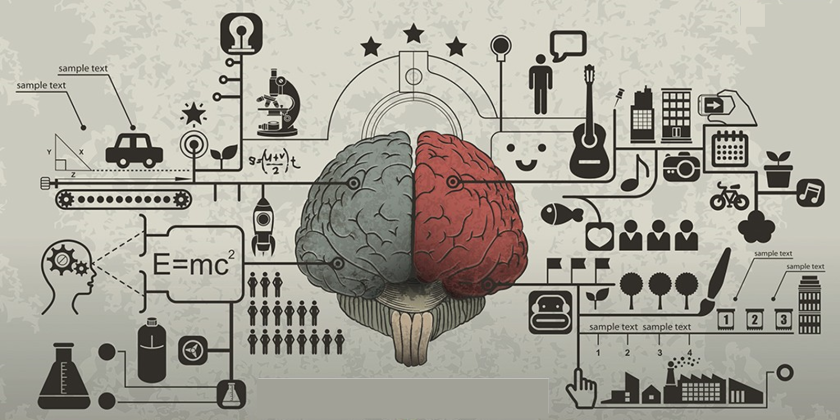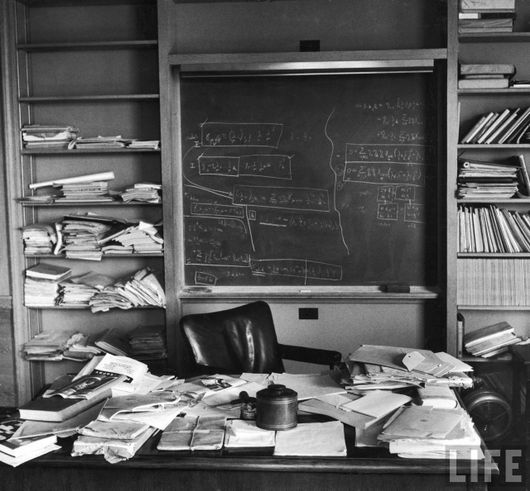Cluttered Desk : cluttered mind :: Empty Desk : ?

Couple of days back, I happened to be meeting the HR head of a fairly big organisation. While waiting for the meeting to start, I happened to look around. There seemed to be a lot of commotion going around in the office. I could see people clearing out desks, some were tearing up papers and scrapping them, others were impatiently punching holes and filing some documents. In a nutshell, the whole office seemed to be in a spring-cleaning mode.
When I asked around, one of the employees volunteered some information – it was the “clean desk” day – which meant – a surprise audit team would be visiting the office who would take note of how much clutter was lying around, rap those who accumulated clutter and reward those who kept their desk organised and tidy.
Most of us have grown up with the idea that orderliness breeds success. But what if messiness, especially a messy desk, offers its own rewards?
Recently a study was conducted by Kathleen Vohs in the University of Minnesota to gauge relative creativity in tidy vs cluttered environments. A simple study, in which the researchers asked the participants to come up with as many uses of ping pong balls as possible. The results showed that those in the messy room generated five times as many highly creative ideas as compared to their counterparts.
You might be well aware that, some of the best innovators built miraculous order from messy workspaces. Einstein had once had once said, “If a cluttered desk is a sign of a cluttered mind, of what, then, is an empty desk a sign?” Steve Jobs, Mark Zuckerberg have also all been known to work from cluttered desks. This is the image of Einstein’s desk, on the day he died.

Of course, heightened creativity is the result of more than just having papers strewn across your desk. Recent neuroscientific research shows that in creative-minded people, the areas of the brain that create imagination are especially well-connected. While letting your workspace run a little wild might augment creativity, the link is not necessarily causal.
In my many countless meetings, in the past 17 years, I have seen all kinds of leaders, and their desks. Some are clean and sparklingly tidy, some are strewn with papers, some have rewards and certificates, some have the pictures of countless off-sites, some have family pictures. I have one conclusion: creative juices don’t start flowing if the desk is messy, nor do we become a rule abider if we clean up our desk. But one thing is for sure – by the way, you keep your desk, a smart observer/ assessor can definitely understand what kind of a person you are and how you prioritise your life & work. So, messiness and cleanliness is a resultant of our character rather than the other way around, it is definitely a big sign of “who you are”.
In a bank branch I visited recently, I saw that the desks of all the teams, except the teller, were strewn with papers of all kinds and sizes with innumerable stationery items lying around. As an assessor, I know quickly how the branch operates. You wouldn’t feel the need to ask any further questions to know how their systems work. In another Multi-national bank branch that I visited recently, the desks were clean without a single piece of paper out of place.
Is creativity important for your team or is it more important for them to abide by the rules? Next time you have a question on why one of your team members doesn’t follow the guidelines or the processes, you might just want to walk up to his desk! Assessments are all about observation, it is not a complex science. At Able Ventures, we are constantly looking for ways to build simplicity around assessments.
I would love to know your point of view on creativity, rule adherence and how you assess human behaviour. Do write to me at smita@ableventures.in
About me: I have conducted over 45,000 assessments, trained over 35,000 participants, designed over 800 competencies and engaged with over 50 clients. I would be happy to share some of our best practices and help you in overcoming your people related challenges.






